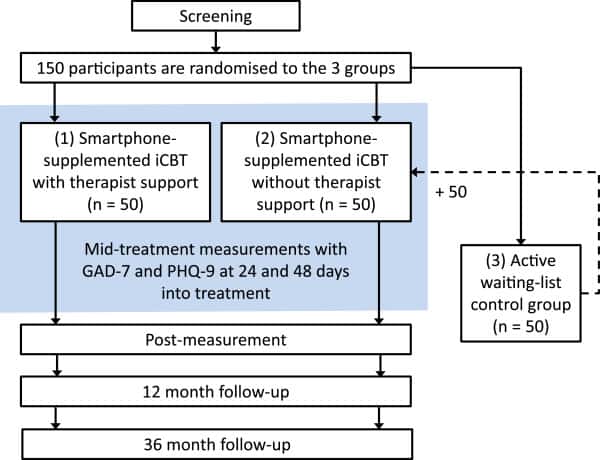Today we published a new paper in the Trials journal (impact factor 2.21) entitled “Guided and unguided CBT for social anxiety disorder and/or panic disorder via the Internet and a smartphone application: study protocol for a randomised controlled trial“.
Smartphone technology presents a novel and promising opportunity to extend the reach of psychotherapeutic interventions by moving selected parts of the therapy into the real-life situations causing distress. This randomised controlled trial will investigate the effects of a transdiagnostic, Internet-administered cognitive behavioural (iCBT) self-help program for anxiety, supplemented with a smartphone application. The effect of added therapist support will also be studied.
Methods/Design
One hundred and fifty participants meeting diagnostic criteria for social anxiety disorder and/or panic disorder will be evenly randomised to either one of three study groups:
- Smartphone-supplemented iCBT with therapist support;
- Smartphone-supplemented iCBT without therapist support; or
- An active waiting list control group with delayed treatment.
Primary outcome measure will be the Generalised Anxiety Disorder 7-item self-rating scale. Secondary measures include other anxiety, depression and quality of life measures. In addition to pre- and post-treatment measurements, the study includes two mid-treatment (days 24 and 48) and two follow-up assessments (12 and 36 months) to assess rapid and long-term effects.
Figure 1: Participant flow and point of randomization and assessment.
To our knowledge, this is the first study to investigate the effectiveness of smartphone-supplemented iCBT for anxiety disorders. Hence, the findings from this trial will constitute great advancements in the burgeoning and promising field of smartphone-administered psychological interventions. Limitations are discussed.
Figure 2: Screenshots of application in simulated use. (a) Choosing a behaviour from repertoire. (b) Saving a comment after carrying out a behaviour. (c) Statistics of carried-out behaviours. (d)Feedback.
Lindner, P., Ivanova, E., Ly, K. H., Andersson, G., & Carlbring, P. (2013). Guided and unguided CBT for social anxiety disorder and/or panic disorder via the Internet and a smartphone application: study protocol for a randomised controlled trial. Trials, 14:437. [doi:10.1186/1745-6215-14-437]


